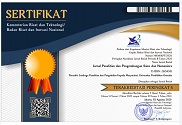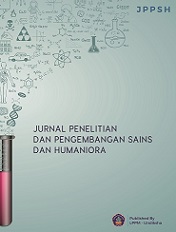Assessment of the Implementation of the Islamic Studies Curriculum in Senior High Schools
DOI:
https://doi.org/10.23887/jppsh.v8i3.89598Keywords:
Assessment, Curriculum, Islam, High SchoolAbstract
In recent times, many students have cheated on exams. Factors related to curriculum content activities and successful completion of all topics expected to be taught to students at various levels of Islamic education, within the specified time period were found to be very ineffective in today's schools. This research aims to examine the implementation of the Islamic studies curriculum in senior high schools. A descriptive survey design was used in this study. A total of 9,231 people constituted the study population while three hundred and sixty eight (368) participants were sampled using Krejcie and Morgan's sampling table. Five (5) research questions were asked and answered. The collected data was analyzed using descriptive statistics with the help of the Statistical Package for Social Sciences. The research design adopted for this study is a descriptive survey. The research results show that the availability of qualified Islamic studies teachers is necessary for the successful implementation of the Islamic Studies curriculum in high schools. Considering these findings, the research concludes that the use of appropriate teaching methods in teaching the Islamic Studies curriculum has proven to be effective because qualified teachers and teacher capacity development increase the success of implementing the Islamic Studies curriculum which has not yet been fully implemented in senior secondary schools. Implications of this research can provide insight into the effectiveness of curriculum implementation, identify challenges faced in the learning process, and offer recommendations for improvements to improve the quality of Islamic Studies education.
References
Ayuningsih, W., Syafaruddin, S., & Amiruddin, M. S. (2021). Implementation Of Islamic Education Curriculum Development In Al-Ulum Islamic School Medan. Budapest International Research And Critics In Linguistics And Education (Birle) Journal, 3(2), 1033–1044.
Azuakor, P. O. (2018). Nigeria Highly Religious But Highly Immoral, Need For Authentic Moral Education. Journal Of Moral Education In Africa, 3(2), 2.
Baker, W. (2023). The Moral Attitudes Of Uk Youth: Bringing Morality Back To The Sociology Of Education. British Journal Of Sociology Of Education, 41(7), 911–926.
Bakhurst, D. (2020). Teaching And Learning: Epistemic, Metaphysical And Ethical Dimensions—Introduction. Journal Of Philosophy Of Education, 54(2), 255–267.
Borker, G. (2023). Safety Fislamic Religious Studiest: Perceived Risk Of Street Harassment And Educational Choices Of Women (Pp. 12–45). Department Of Economics, Brown University.
Briggs, F. (2020). Child Protection: The Essential Guide For Teachers And Other Professionals Whose Work Involves Children. Woodslane Press.
Burgess, A., Roberts, C., Ayton, T., & Mellis, C. (2020). Implementation Of Modified Team-Based Learning Within A Problem Based Learning Medical Curriculum: A Focus Group Study. Bmc Medical Education, 18(1), 74.
Dorroll, C. M. (Ed.). (2020). Teaching Islamic Studies In The Age Of Isis, Islamophobia, And The Internet. Indiana University Press.
Grunspan, D. Z., Nesse, R. M., Barnes, M. E., & Brownell, S. E. (2023). Core Principles Of Evolutionary Medicine: A Delphi Study. Evolution, Medicine, And Public Health, 2018(1), 13–23.
Grusec, J. E. (2024). Principles Of Effective Parenting: How Socialization Works. Guilford Publications.
Halik, A., Zulfianah, Z., & Naim, M. (2020). Strategies Of Islamic Education Teachers To Increase Students’ Interest In Learning And Practicing In State Junior High School Lanrisang (Smpn) 1 Lanrisang, Pinrang. Madania: Jurnal Kajian Keislaman, 22(2), 253–264.
Ibrahim, A. (2018). Teachers’ Perceptions Towards The Content Of Secondary School Islamic Studies Curriculum In Relation To Vocational Islamic Education Values In Uae (P. 19).
Mahlaba, T. T. (2020). Ethical Leadership And Financial Performance: A Case Study Of Harry Gwala District Municipality In The Kwazulu-Natal Province (P. 18).
Mansir, F., & Karim, A. (2023). Islamic Education Learning Approaches In Shaping Students’ Emotional Intelligence In The Digital Age. Hayula: Indonesian Journal Of Multidisciplinary Islamic Studies, 4(1), 67–86.
Miller, V. J. (2020). Access Denied: Tracking As A Modern Roadblock To Equal Educational Opportunity. Nyul Rev, 93, 903.
Mogboh, V. E., & Okoye, A. C. (2023). Formative And Summative Assessment: Trends And Practices In Basic Education. Journal Of Education And Practice, 10(27), 39–45.
Morgan, M. A. (2023). Too Cruel For School: Exclusionary Discipline And The Incorrigible Student (P. 21).
Mulenga, I. M. (2022). Conceptualization And Definition Of A Curriculum (P. 15).
Mulyasa, E. (2019). Improved Quality Management Based Learning For Preparing The Character Of Graduates In Response To Globalization Era. International Journal Of Education And Research, 4(11), 385–393.
Njoku, N. C., & Njoku, D. I. (2022). Challenges To Effective Implementation Of Islamic Religious Studies Curriculum: A Study Of Secondary School Pupils In Ebonyi State Of Nigeria. Journal Of Education And Practice, 6(18), 176–180.
Obadan, M. I. (2020). Poverty Reduction In Nigeria: The Way Forward. Cbn Economic And Financial Review, 39(4), 159–188.
Otara, A., & Omolo, H. O. (2020). School Organizational Factors As Predictors Of Student Achievement: Principals’ Perspective. International Journal For Educational And Vocational Studies, 3(1), 24–36.
Owoeye, J. S., & Olatunde Yara, P. (2019). School Facilities And Academic Achievement Of Secondary School Agricultural Science In Ekiti State, Nigeria. Asian Social Science, 7(7), 64–74.
Renata, R., Wardiah, D., & Kristiawan, M. (2020). The Influence Of Headmaster’s Supervision And Achievement Motivation On Effective Teachers. International Journal Of Scientific & Technology Research, 7(4), 44–49.
Shahamat, H., Nadimi, H., Gharehbaglou, M., & Keramati, E. (2019). An Analysis Of The Motivating Factors Underlying The Hidden Curriculum Components Through The Lens Of The Iranian Students Of Architecture: A Qualitative Study. Teaching And Teacher Education, 86(2), 29.
Suryawati, E., & Osman, K. (2020). Contextual Learning: Innovative Approach Towards The Development Of Students’ Scientific Attitude And Natural Science Performance. Eurasia Journal Of Mathematics, Science And Technology Education, 14(1), 61–76.
Tan, C. (2023). Educative Tradition And Islamic Schools In Indonesia. Journal Of Arabic And Islamic Studies, 14(2), 47–62.
Downloads
Published
Issue
Section
License
Copyright (c) 2024 Owoyale-Abdulganiy, Ibrahim Solahudeen , Abdulwaahid Tiamiy

This work is licensed under a Creative Commons Attribution-ShareAlike 4.0 International License.
Authors who publish with the Jurnal Penelitian dan Pengembangan Sains dan Humaniora agree to the following terms:
- Authors retain copyright and grant the journal the right of first publication with the work simultaneously licensed under a Creative Commons Attribution License (CC BY-SA 4.0) that allows others to share the work with an acknowledgment of the work's authorship and initial publication in this journal.
- Authors are able to enter into separate, additional contractual arrangements for the non-exclusive distribution of the journal's published version of the work (e.g., post it to an institutional repository or publish it in a book), with an acknowledgment of its initial publication in this journal.
- Authors are permitted and encouraged to post their work online (e.g., in institutional repositories or on their website) prior to and during the submission process, as it can lead to productive exchanges, as well as earlier and greater citation of published work. (See The Effect of Open Access)









